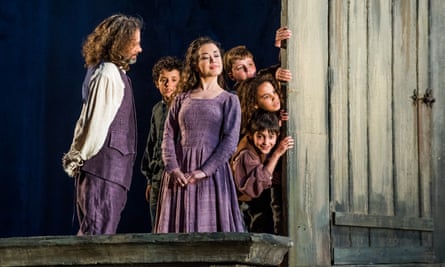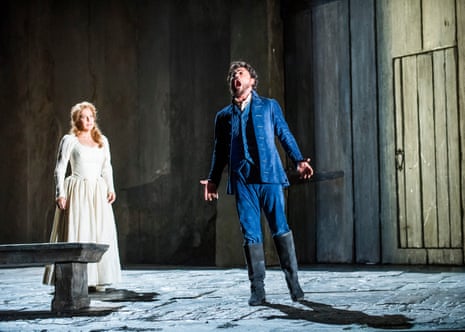Carefully rehearsed by Andrew Sinclair, the current revival of French film director Benoît Jacquot’s 2004 production of Massenet’s opera, founded on Goethe’s epistolary novel, is one of the Royal Opera’s more traditional stagings. It retains the 18th-century look of the original text both in Charles Edwards’s realistic sets and in Christian Gasc’s period costumes.
Visually, each scene creates a strong sense of atmosphere to match both the diverse moods of the drama and Massenet’s masterly score, which is superbly played; indeed what is arguably the evening’s most exceptional performance comes from the Royal Opera House orchestra under conductor Antonio Pappano.
No opera composer possessed more finely honed professional skills than Massenet. His immaculately judged orchestral writing not only delineates the opera’s darkly intense emotional world – underpinning each and every shift in the volatile though frequently repressed feelings of the central couple – but also supplying wonderful aural scene-painting, especially at such evocative points as the moonlight interlude towards the end of Act 1. Here and elsewhere, Pappano and his players search out the score’s minutest instrumental gestures and articulate them with meaning.
They also provide an ideal musical frame for the individual portrayals offered by Vittorio Grigòlo’s Werther and Joyce DiDonato’s Charlotte: the gentle radiance of the latter’s supple mezzo rises to belatedly liberated passion in Act 3, when the reluctantly married heroine’s stoical attempt to keep her true feelings under wraps gives way under the violent impact of Werther’s unexpected reappearance.
Grigòlo is stiffer than DiDonato as an actor, with many of his physical responses looking like the stock motions of an Italian tenor taking a gamble on a high note, but he nevertheless wins success with his ardent attack while offering a regularly nuanced and stylistically assured vocal interpretation, even if he cannot match DiDonato’s conscientious French. Ultimately, however, the chemistry between the two of them feels on the tepid side, despite their supposed mutual obsession.

While this is an opera in which all the other characters are distinctly secondary to the leading couple, everyone on stage makes a positive impression. Bright-toned American soprano Heather Engebretson is genuinely touching as Charlotte’s younger sister Sophie, skilfully suggesting a teenager disconcertingly inundated by novel feelings for the romantic young poet whose arrival has turned the sluggish 18th-century community of Wetzlar upside down.
Serbian baritone David Bižić is physically and vocally imposing as Charlotte’s husband Albert, whose steadily increasing antipathy to the exotically unstable stranger clearly besotted with his wife precipitates the final tragedy.
Jonathan Summers presents a scrupulous account of Charlotte’s widowed father, the local bigwig, while the team of kids playing his half-dozen younger children do a top job. Yuriy Yurchuk and François Piolino maximise the potential of village drunks Johann and Schmidt, while Rick Zwart and Emily Edmonds present a neat double cameo as the bookish Brühlmann and his fiancee Käthchen, whose joint fascination with the fashionable poet Klopstock provides a rare moment of gentle humour in an overwhelmingly sombre piece.

Comments (…)
Sign in or create your Guardian account to join the discussion